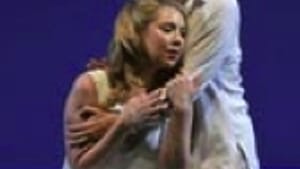Stay in the Loop
BSR publishes on a weekly schedule, with an email newsletter every Wednesday and Thursday morning. There’s no paywall, and subscribing is always free.
Timeless myth, psychological puzzle
Opera Company's "Orphée et Eurydice' (1st review)

From 2005 to 2007, I lived with Orpheus and Eurydice and dozens of versions of their complicated story as it appears in poetry, dance, music, painting, theater, film and opera. My years with the lyre playing Orpheus, the all too silent Eurydice, resulted from a collaboration with composer William Duckworth and the webmedia artist Nora Farrell.
The plan was to acknowledge the 400th anniversary of what is considered the first European opera: Claudio Monteverdi's Orfeo, Favola in musica, which premiered in Mantua, Italy on February 24, 1607. We performed three versions "“as a 26-part on-line podcast, as a day-long outdoor procession with a hundred performers, and in a theater as Orpheus: The Myth Retold, on February 24, 2007.
As with all myths, Orpheus and Eurydice weaves together several themes, among them love and loss, love and misunderstanding, the power of music, the loneliness of the true artist, a journey into the underworld, stupid gods, impulsiveness vs. control, earth/air/fire/water, the lives of the dead, singing, and long walks in wild landscapes. Choose a century, culture or ideology and Orpheus can be about a heroic lover facing death, or how music is a both a blessing and a curse. Hadestown, a recent folk opera version by Anais Mitchell, is "set in a post-apocalyptic American depression era" and ruminates, in part, on love, music and making money. .
From castrato to female
I was reminded of all this Thursday night after attending the Opera Company of Philadelphia's staging of the 90-minute Gluck/ Berlioz Orphée et Eurydice at the Perelman Theater. Gluck composed versions of Orpheus in 1762 and 1774 (with a libretto by Calzabigi), which were then revised by Berlioz in 1859. Berlioz altered the orchestration, added instruments and changed Orpheus from a male voice (originally a castrato) to a female voice— usually a contralto, or, in this production, the cool and incisive singing of mezzo-soprano Ruxandra Donose.
Gluck's innovation— his gift to future operas— was to raise the ante on the entertainment of his day by writing poignant music for the key psychological moments in the drama. This occurs most notably in the last act, when Orpheus must persuade Eurydice to follow him back from the underworld. This scene is starkly staged under subtle lighting, with the slender, sharp-featured Donose and the golden-haired soprano Maureen McKay convincingly sustaining the lovers' tense exchanges and understandable fear and confusion.
Eurydice insists to the point of demanding that Orpheus turn around and face her, while he knows the consequences if he does. In Gluck's version, Orpheus is instructed not to tell Eurydice why he cannot look at her. In other versions, which add to the tortuous complexity of the myth and the pleasure of witnessing it, Orpheus walks in silence and Eurydice follows him through the darkness to the light.
For audiences, the suspense builds and the questions multiply: What is she thinking? When will he turn to look at her? Where? And, ultimately, knowing what will happen, why does he turn around?
Limitations of good music
Without doubt, Gluck/Berlioz's sponsors and audiences didn't want to think that much about the existential predicament of Orpheus and Eurydice. Nor did they likely want to be bothered with the myth's implicit critique, which suggests that making extraordinary music might allow one to visit the land of the dead but doesn't guarantee love, happiness or success. Orpheus, a singer and a lyre player, comes to realize that his artistic gift comes with strings attached.
Leaving such nuances for later generations to unravel, Gluck/Berlioz adhered to the opera seria conventions of their times (read: paid the bills) and included several ballet sections, a chorus and a palliative finale thanking the gods (read: patrons)— for what, I'm not sure.
The gift presented by the Opera Company of Philadelphia, with its Orchestra and 26-member chorus, along with dance by choreographer Amanda Miller, is a tightly wound and satisfying production, with a few strings attached.
Spare setting
As if conceding the seriousness of the work, and to underscore its psychological intensity, the set is a grey trapezoidal box, bare as a warehouse. A rectangle of light on the stage floor frames the portal to the underworld and, flushes of light— either crayoned bright or muted— tint the mood throughout the performance.
This spare setting doesn't always serve the opera's variable demands. Since the Perelman stage isn't large, when the black costumed chorus of mourners surrounds Orpheus, or when they all gather to romp in the Elysian Fields, led by three couples in enchanting period-like dances, it looks like there is too much ado doing.
But soon enough, such 18th-Century silliness gives way to the deeper and darker entanglements among the characters, principally Orpheus, who seems forever fated to be bound to our attempts to comprehend and relate what happened to him. And why.♦
To read another review by Robert Zaller, click here.
To read another review by Steve Cohen, click here.
The plan was to acknowledge the 400th anniversary of what is considered the first European opera: Claudio Monteverdi's Orfeo, Favola in musica, which premiered in Mantua, Italy on February 24, 1607. We performed three versions "“as a 26-part on-line podcast, as a day-long outdoor procession with a hundred performers, and in a theater as Orpheus: The Myth Retold, on February 24, 2007.
As with all myths, Orpheus and Eurydice weaves together several themes, among them love and loss, love and misunderstanding, the power of music, the loneliness of the true artist, a journey into the underworld, stupid gods, impulsiveness vs. control, earth/air/fire/water, the lives of the dead, singing, and long walks in wild landscapes. Choose a century, culture or ideology and Orpheus can be about a heroic lover facing death, or how music is a both a blessing and a curse. Hadestown, a recent folk opera version by Anais Mitchell, is "set in a post-apocalyptic American depression era" and ruminates, in part, on love, music and making money. .
From castrato to female
I was reminded of all this Thursday night after attending the Opera Company of Philadelphia's staging of the 90-minute Gluck/ Berlioz Orphée et Eurydice at the Perelman Theater. Gluck composed versions of Orpheus in 1762 and 1774 (with a libretto by Calzabigi), which were then revised by Berlioz in 1859. Berlioz altered the orchestration, added instruments and changed Orpheus from a male voice (originally a castrato) to a female voice— usually a contralto, or, in this production, the cool and incisive singing of mezzo-soprano Ruxandra Donose.
Gluck's innovation— his gift to future operas— was to raise the ante on the entertainment of his day by writing poignant music for the key psychological moments in the drama. This occurs most notably in the last act, when Orpheus must persuade Eurydice to follow him back from the underworld. This scene is starkly staged under subtle lighting, with the slender, sharp-featured Donose and the golden-haired soprano Maureen McKay convincingly sustaining the lovers' tense exchanges and understandable fear and confusion.
Eurydice insists to the point of demanding that Orpheus turn around and face her, while he knows the consequences if he does. In Gluck's version, Orpheus is instructed not to tell Eurydice why he cannot look at her. In other versions, which add to the tortuous complexity of the myth and the pleasure of witnessing it, Orpheus walks in silence and Eurydice follows him through the darkness to the light.
For audiences, the suspense builds and the questions multiply: What is she thinking? When will he turn to look at her? Where? And, ultimately, knowing what will happen, why does he turn around?
Limitations of good music
Without doubt, Gluck/Berlioz's sponsors and audiences didn't want to think that much about the existential predicament of Orpheus and Eurydice. Nor did they likely want to be bothered with the myth's implicit critique, which suggests that making extraordinary music might allow one to visit the land of the dead but doesn't guarantee love, happiness or success. Orpheus, a singer and a lyre player, comes to realize that his artistic gift comes with strings attached.
Leaving such nuances for later generations to unravel, Gluck/Berlioz adhered to the opera seria conventions of their times (read: paid the bills) and included several ballet sections, a chorus and a palliative finale thanking the gods (read: patrons)— for what, I'm not sure.
The gift presented by the Opera Company of Philadelphia, with its Orchestra and 26-member chorus, along with dance by choreographer Amanda Miller, is a tightly wound and satisfying production, with a few strings attached.
Spare setting
As if conceding the seriousness of the work, and to underscore its psychological intensity, the set is a grey trapezoidal box, bare as a warehouse. A rectangle of light on the stage floor frames the portal to the underworld and, flushes of light— either crayoned bright or muted— tint the mood throughout the performance.
This spare setting doesn't always serve the opera's variable demands. Since the Perelman stage isn't large, when the black costumed chorus of mourners surrounds Orpheus, or when they all gather to romp in the Elysian Fields, led by three couples in enchanting period-like dances, it looks like there is too much ado doing.
But soon enough, such 18th-Century silliness gives way to the deeper and darker entanglements among the characters, principally Orpheus, who seems forever fated to be bound to our attempts to comprehend and relate what happened to him. And why.♦
To read another review by Robert Zaller, click here.
To read another review by Steve Cohen, click here.
What, When, Where
Orphée et Eurydice. Opera by Christof Willibald Gluck (Hector Berlioz adaptation) directed by Robert B. Driver; Corrado Rovaris, conductor. In French with English supertitles. Opera Company of Philadelphia production through June 25, 2010 at Perelman Theater, Kimmel Center, Broad and Spruce Sts. (215) 732-8400 or www.operaphila.org.
Sign up for our newsletter
All of the week's new articles, all in one place. Sign up for the free weekly BSR newsletters, and don't miss a conversation.
 AJ Sabatini
AJ Sabatini